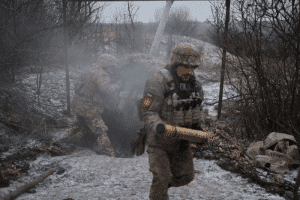PNN – The hesitation of the United States and the European Union about the continuation of support for Ukraine has become a new challenge for the government of Kiev; An issue that can ultimately end in Russia’s favor in this war.
According to Pakistan News Network, the Financial Times wrote that this week could play an important role in the future of Ukraine. While the West has promised unlimited support to Ukraine, the United States and the European Union are grappling with the challenge of securing new funding for Ukraine.
Last Wednesday, Ukrainian President Volodymyr Zelensky said in a video speech among the G7 leaders: Russia hopes for one thing: that the cohesion of the free world will collapse next year. Russia hopes that America and Europe will weaken and not support Ukraine.
Financial Times wrote: Zelensky’s request is not rhetorical. Just a few hours after his speech, the US Senate rejected the White House’s latest request to approve legislation authorizing $60 billion in financial aid to Ukraine. Across the Atlantic region, the European Commission’s proposal to allocate 50 billion euros to support Ukraine over the next four years is on hold ahead of next week’s EU summit and several months after a dispute between member states over how to fund this funding.

Without the approval of one of these financial packages, Ukraine’s long-term financial security will be in question. If none of them are approved, this country will face a dark future.
The Financial Times continued: At a moment when Ukraine is desperate for long-term financial and military commitments from the West as a bulwark against protracted Russian aggression, the lack of sufficient resources from its two most important backers has raised doubts about the will of its American and European allies to continue.
With the EU, it is not just financial support that is at stake. The union is expected to act as a supporter of Kiev’s integration with the West and the prospect of Ukraine’s eventual membership in the union, but Hungary’s opposition has hindered this.
What worries Ukraine is that the support for this country – which was previously a matter of broad party agreement – has become a bargaining chip for both sides of the Atlantic.
Fiscal pressure on Ukraine is severe and unrelenting, and the country’s government uses all of its tax revenue to cover defense costs, which account for nearly half of its public spending. While Ukraine has received almost $100 billion in weapons and military training, it needs foreign aid to pay for government and public services, salaries and benefits. According to the budget plan that was approved by the Ukrainian parliament last month, these expenses include 41 billion dollars of surplus budget in the next year.
According to the Financial Times, Ukraine is counting on 18 billion dollars from the European Union, 8.5 billion dollars from the United States, 5.4 billion dollars from the International Monetary Fund, 1.5 billion dollars from other development banks and 1 billion dollars from the UK. has opened and at the same time is still consulting with other partners of this country such as Japan and Canada.
This media added: Although – whatever happens in Washington or Brussels – a part of this money will be paid, but Kiev needs cash next month. If the country’s negotiations do not succeed and it cannot borrow enough money, it may resort to financing this money by the central bank, which can cause extreme inflation and put the country’s financial stability at risk.
Hungary’s action to prevent more aid to Ukraine has sounded the alarm for this country. Hungary has vowed to withhold further support for Kyiv as part of its pressure on the EU to free up Budapest’s assets for legal violations.

In Washington, waning public support for Ukraine as the war drags on and Democrats lose control of the US House of Representatives after the midterm elections have created a political stalemate.
In recent weeks, Republicans have called for more aid to Ukraine to be tied to tougher immigration measures on the southern border, which has been opposed by Democrats.
White House officials are increasingly worried and frustrated as cash for Ukraine drains. The tone of US President Joe Biden has changed significantly this week. He warned that if Ukraine is left alone and Russia wins, Vladimir Putin may attack a NATO ally and bring the United States into the war.
The Financial Times wrote in part of its report, citing data compiled by the Kiel Institute: “Overall, Western aid to Ukraine reached its lowest point this fall.” The value of new pledges between August and October was 87% lower than the same period in 2022, while only 20 of the 42 states surveyed by the Kiel Institute pledged new aid packages to Ukraine in the past three months, the lowest share.
The media described the next seven days as crucial for the future of Ukraine and wrote: The International Monetary Fund is expected to publish its latest updated report on Ukraine on Sunday, detailing the dimensions of its situation and possible financial needs.
EU diplomats will also negotiate on Sunday and throughout this week on the agreement on the financial package for Ukraine. White House officials and Democrats are also still hoping to reach an agreement on Ukraine’s budget. They are not worried about the immediate impact of such a standoff, but the failure to provide aid to Kiev and its impact on America’s leadership role worries them.
Senate Intelligence Committee Chairman Mark Warner said this week that “assessments by our intelligence community suggest that Putin believes that Ukraine will collapse within months without renewed American support.” Why do we need to prove Putin right at this point?
Democratic Senator from Colorado Michael Bennett also said in a statement to the Financial Times: “We cannot allow the disruption in the Congress hall to prevent the United States from fulfilling its moral obligations to finance Ukraine.” If we fail to act, it will send a terrible message to Putin.
The Financial Times concluded: As Ukraine enters a second straight winter and Russia uses a large stockpile of missiles to target the country’s vital energy and heating infrastructure, the West’s failure to preserve financial lifelines is taking a heavy toll on troop morale.

